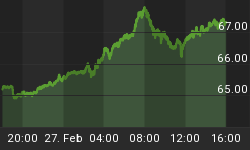Just because the financial markets and press have responded to the revaluation of the Chinese currency with a big yawn, as China continues to take small steps toward making the Yuan a complete convertible currency, the real question is "could the Chinese Yuan become a world reserve currency on par with the Dollar, Euro, and Japanese Yen? We are a believer in the "Big Yuan".
Investors are wondering what the consequences will be as the Yuan is slowly but steadily revalued upwards. For starters, the following is likely to occur:
-
All Asian currencies will increase in value so Asians will be able to buy more for their money (the non-Chinese Asians now have less incentive to buy dollars to hold their currencies down to stay competitive with China);
-
As the Yuan and other Asian currencies rise in value, Wal-Mart, and other retailers, who import billions of dollars worth of goods from Asia, will have to pay more for imports. Price increases will ultimately have to be passed on to the American consumer;
-
The demand for U.S. treasuries will go down as the China and Asian central banks move to a currency "basket" allowing for less dollar asset reserves.
Hundreds of billions of dollars are pouring into China to take advantage of the rise in the renminbi. Up until now, the only way to play the Yuan game has been to invest in China, which has attracted the usual hot-money, speculator crowd. However, there is something much bigger in the offing.
China has a long way to go to complete its revaluation. The realization of an ever-rising Yuan, will rock the status quo. China can now go to Iran, Venezuela, and Nigeria and exchange renminbi for oil - and these countries will be better off than if they took dollars - because the Yuan is guaranteed to rise against the dollar! Besides, if any central banks in the Middle Eastern oil producing countries accepted Yuan over dollars for oil, and they suddenly needed dollars sometime in the future, the central bank of China now has $700 billion of dollars to swap. Clearly, over the long term, the Yuan has the potential to become a great currency.
What about other countries with resources to sell China (like the rest of Africa, South America and Australia)? Wouldn't it be in their interests to exchange Yuan for their raw materials? Why take dollars when you can take Yuan that will appreciate against the dollar! Again, if these countries ever needed dollars or even Euros in the future, they would be able to swap for them later - no problem!
So, what is China really up to? Not only is China looking at energy deals in Sudan, Zimbabwe, Algeria, Angola, Kazakhstan, Turkmenistan (and any other "oil-stans"), they seem to be everywhere, particularly showing up in places that need a big powerful friend to protect them from America, or the rest of the civilized world. Countries, such as Iran and Venezuela, clearly need protection from the United States. (Iran breeds terrorists and wants the bomb, while Hugo Chavez in Venezuela is a caricature of Castro with oil.) The world is full of petty dictators that need friends. You may recall when Iraq wanted to shift from being paid for oil in dollars, to being paid in euros; the move did not win many friends at the White House.
China has a one party rule and dictatorship by committee and they know how to cut deals with strong men. With China showing up wherever there is oil and resources, rulers of the less than democratic countries must see a "win win" situation with China. If they accept the Yuan in exchange for their resources, not only do they get money that is better than the dollar, they shake hands with a very powerful friend that can sell them arms and keep them in power! Letting China have a reserve currency has major geo-political implications, and they are not all good for the United States.
The textbook definition of a reserve currency is "a foreign currency held by a central bank or monetary authority for the purposes of exchange intervention and the settlement of intergovernmental claims". To put it more simply, the national joy of having a reserve currency means if a country wants to buy something, all it has to do is print up some money. Just like in America, China will be able to purchase any goods and services it wants, simply by printing up some Yuan.
So, now what happens? We believe that central banks worldwide are going to be eager to take the Yuan as a reserve currency because it is guaranteed to go up in relative value. Indeed, with the U.S. running massive federal and trade deficits, central banks around the globe remain eager to diversify away from the dollar.
With a reserve currency, China's government would be crazy not to start printing and spending. Before the Yuan revalued, the world was focused on the $700 billion in U.S. dollar reserves the Chinese could spend. Now, there are already signs that China is trying to buy U.S. brands, U.S. oil companies, and almost anything that isn't nailed down around the world. China's unprecedented and growing foreign exchange reserves can now be used as the largest exchange stabilization fund the world has ever seen! In Asia, dollar diplomacy, pushed by the IMF, will quietly fade into history.
How will all this affect the stock markets? Remember: Big journeys begin with small steps! As an investor, shouldn't you be interested in what China wants to buy?















